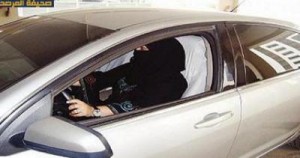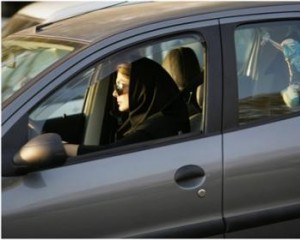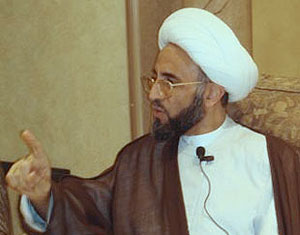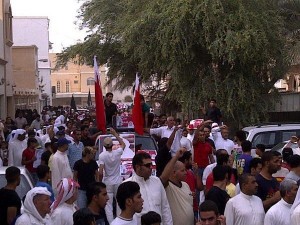Manal, a 32-year-old woman, is planning something she’s never done openly in her native Saudi Arabia: Get in her car and take to the streets, defying a ban on female drivers in the kingdom.
Manal and ten other people are organizing a campaign on Facebook and Twitter urging Saudi women with international driver’s licenses to join them starting June 17, risking their jobs and their freedom. The coordinated plan isn’t a protest, she said.
“I’m doing it because I’m frustrated, angry and mad,” Manal, who asked to be identified only by her first name, said in an interview from the eastern city of Dhahran. “It’s 2011 and we’re still discussing this insignificant right for women.”
The risk the women are willing to take underscores both their exasperation with the restrictions and the infectious nature of the changes sweeping the region. Saudi Arabia, which has the world’s biggest oil reserves, so far has avoided the mass demonstrations that have toppled the leaders of Tunisia and Egypt and threaten officials in Libya, Yemen and Syria.
“These events have taught Saudi women to join ranks and act as a team,” said Wajeeha al-Howeider, a Saudi women’s rights activist, in a telephone interview from Dhahran. “This is something they could only have learned from those revolutions.”
Male Approval
Saudi Arabia enforces the ascetic Wahhabi version of Sunni Islam. Women aren’t allowed to have a Saudi driver’s permit, even though some drive when they’re in the desert away from urban areas. They can’t travel or get an education without male approval or mix with unrelated men in public places. They aren’t permitted to vote or run as candidates in municipal elections, the only ones the kingdom allows.
The last time a group of women publicly defied the driving ban was on Nov. 6, 1990, when U.S. troops had massed in Saudi Arabia to prepare for a war that would expel Iraq from Kuwait. The Saudi women were spurred by images of female U.S. soldiers driving in the desert and stories of Kuwaiti women driving their children to safety, and they were counting on the presence of international media to ensure their story would reach the world and lessen the repercussions, according to Noura Abdullah, 55.
Abdullah was one of forty-seven drivers and passengers who stayed out for about an hour before being arrested. They were banned from travel for a year, lost their jobs for 2 1/2 years and were condemned by the powerful clergy as harlots.
Spread the Word
Now it’s “superb” that a younger generation is following in their footsteps, Abdullah said in an interview from Riyadh, the capital. She doesn’t have an international driver’s license, so she will help by spreading the word about the event with telephone calls, text messages and emails, she said.
“Their timing is perfect,” she added. “There’s momentum in Saudi Arabia now and that should help.”
King Abdullah has taken steps this year to ensure regional turmoil is confined outside his borders, pledging almost $100 billion of spending on homes, jobs and benefits. He also has promised to improve the status of women. He opened the first co- educational university in 2009; appointed the kingdom’s first female deputy minister, Nora bint Abdullah al-Fayez, the same year; and has said he will provide more access to jobs for women, who make up about 15 percent of the workforce.
A change of policy in 2008 allowed women to stay in hotels without male guardians, and an amendment to the labor law allowed women to work in all fields “suitable to their nature.”
‘Largely Symbolic’
Human Rights Watch said in January that “reforms to date have involved largely symbolic steps to improve the visibility of women.” While the United Nations ranked the kingdom in the top one-third of nations in its 2010 Human Development Report — higher than Brazil and Russia — its score for gender equality was much lower. On that measure, which includes assessments of reproductive health and participation in politics and the labor market, Saudi Arabia was 128th of 138 nations, below Iran and Pakistan.
The campaign Manal is helping to organize, called “I will drive starting June 17,” is the latest effort by Saudi women this year to express their desire for more rights. On April 23, a group of 15 women showed up at a registration center in the western city of Jeddah, asking to participate in the September election, the Arab News reported a day later. While they were denied entry, they were permitted to relay their demands to Abdul Aziz al-Ghamdi, the head of the district office, the Arab News said.
The protest against the driving ban has attracted almost 800 Facebook fans since it began May 6.
“We are not here to break the law or demonstrate or challenge the authorities,” the organizers said on their page. “We are here to claim one of our simplest rights.”
Sheikh Mohammed al-Nujaimi, a Saudi cleric, dismissed the campaign, saying statements he makes about religious issues that are posted on websites have received more than 24,000 page views in a day.
The plan is “against the law, and the women who drive should be punished according to the law,” al-Nujaimi said in a telephone interview. Driving causes “more harm than good” to women, because they risk mixing with men they aren’t related to, such as mechanics and gas-station attendants, he added.
“Women will also get used to leaving their homes at will,” al-Nujaimi said.
Other Support
Three telephone calls by Bloomberg News to the mobile phone of a press officer at Saudi Arabia’s Traffic Department, which enforces transit rules in the country, weren’t answered.
The campaign has received the support of some Saudi men. Ahmad al-Yacoub, 24, a Dhahran-based businessman, said he’s joined the effort because “these ladies are not fighting with religion or the government.”
“They are asking for a simple right that they want to practice freely without being harassed or questioned,” al- Yacoub said.
Ghada Abdul-Latif, a 31-year-old rights activist, said she will support the effort by filming it and posting it online; she won’t drive for fear of being jailed before her wedding in June.
“It is a courageous campaign,” said Hatoon al-Fassi, a Saudi historian. “It feels so weird to consider such a human right a courageous movement. But it is in a country such as Saudi Arabia, which is trying to live against the current and life and history.”





























